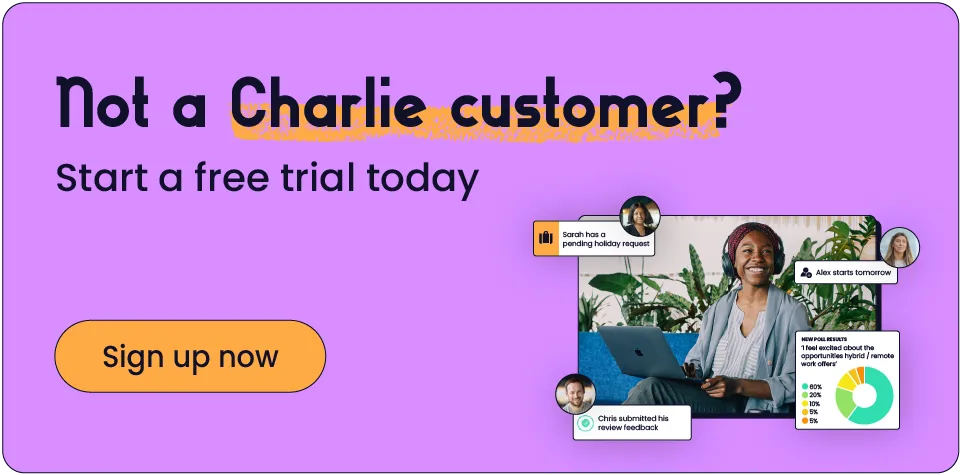HR policies, procedures and examples for 2024 – recommended by an HR expert

Working as Chief of Staff at Charlie means I get involved in all kinds of situations: redundancies, grievances, employment contracts,... You name it, but the one I ask myself is often the same: should I build an HR policy for this?
HR policies may not be the most captivating subject; they’re not as exciting as discussions about growth or performance, but – pretty much like any HR professional, operations manager or chief of staff – they're the foundations on which your business is built.
We wrote this guide as a support system to create your HR policies – you’ll find examples, procedures and policies to inspire you, but remember that you’ll be the one making the final decision on what HR policies your business needs.
What is an HR policy?
An HR policy is a written document that helps outline guidance regarding issues and situations at a company.
An HR policy does several things:
- describes the rights and responsibilities of both employees and employers
- reflects your company values
- ensures compliance with UK employment law
- provides a layer of protection if your company is involved in a legal claim
- fosters fairness and standardisation of procedures across your business
It's therefore important to tailor them to your size, industry and operational approach.
What is the difference between HR policies, HR procedures and HR strategy?
HR policies are intrinsically linked to HR procedures and HR strategy, but they're not exactly the same.
- HR policies are the core of your HR foundations and help you understand what to do in specific HR contexts and regarding employee issues.
- HR procedures are step-by-step documents to help managers and HR personnel address specific situations such as disciplinary meetings, written warnings, etc.
- An HR strategy, on the other hand, gives the company an overarching goal in the long run – that can be expansion, company culture, working environment, etc.
Why do you need HR policies at your small business?
At a small organisation like the one we run at Charlie, it's crucial to have HR policies in place for several reasons:
- to follow our HR strategy and don't forget about it when we have so many other plates spinning
- to give guidance to people dealing with HR who don't necessarily have adequate experience and whose role include other responsibilites
- to become an attractive employer, even when we don't have the means of bigger corporations – for example, by having an attractive hybrid working policy (check out our hybrid working policy template and how we do it at Charlie for more info)
- to protect ourselves against any legal issues and comply with UK employment law (think of how damaging receiving a fine for a forgotten update following a change in legislation could be for a small business)
- to develop a professional approach to HR and make sure we standardise HR practices across the business for when we grow
- to keep up with a moving world of work where employees are always expecting more from their employers
9 HR policies every business should have (including small businesses and startups)

1.Data protection policy and template
A data and protection policy does a few things:
- Helps you comply with data protection law and follow good practice
- Protects your team members and their rights
- Covers your customers and partners
- Ensures transparency about storage and usage of individuals’ data
- Shows you’re protected against data breaches
In this guide on data protection policy, we give you more details about how to do this along with a free template you can use.
2.Grievance policy
Grievances are a cause for a complaint or unfair treatment that a team member might bring to you or to their superior.
You must have a procedure and an HR policy in place to deal with these scenarios, as they could lead you to an employment tribunal if you’re not careful – take into account the issues your team member is having and make sure that you have answers to provide.
Find out how to do it in our grievance policy guide, along with a free template.
3.Equal opportunities policy
Last but not least comes the equal opportunities policy. Following the UK Equality Act of 2010, all businesses now need to have this policy in their employee handbook.
To sum it up, it’s a way to make sure your company is committed to preventing unfair discrimination such as ones based on age, race, sex, gender and religion.
More on this in our guide on how to write an equal opportunities policy.
4.Annual leave policy
Every team member working for you is entitled to some time off – that’s where a holiday policy comes in handy to establish a few rules around when and how to take time off.
In our guide, we run you through a lot of aspects, along with a free template and insights on our own annual leave policy at Charlie:
- Holiday allowance and entitlement
- Rollover onto the next year
- Rules around accrued holidays
- Minimum entitlement
- Restricted period
- When the business is closed
- Time off overlaps
- Disciplinary policy
5.Disciplinary policy
Disciplinary policies are not a joke – they’re a testament to how serious disciplinary procedures are, and that’s where your HR policy should come to reflect this.
Having effective and equitable arrangements for disciplinary policies and procedures is crucial – between standards of conduct and steps to take towards taking disciplinary action, this guide will give you everything you need along with a free template.
6.Bullying and harassment policy and template
Another aspect of HR policies you shouldn’t leave behind is having procedures in place to spot and tackle bullying and harassment at work.
Whether it’s an employee, a client or third parties, your bullying and harassment policy should cover everyone. Harassment can come in multiple forms such as sexually suggestive material, racial comments, and exclusion among many others.
Bullying can be rumours spread about people in the business or physical threats. These are just examples, but everything is covered in our bullying and harassment policy guide as well as a template to build your own.
7.Health and safety policy
Complying with health and safety regulations matters to your business, especially if you want to avoid expensive fines along the way and if you care about the well-being of your employees.
Regardless of what you think you’re doing right, there are rules to follow depending on the industry and the role your team members have – so that’s when having a policy in place will help. Just read our guide to find out more.
Check out our health and safety policy template UK for free.
7.Diversity and inclusion policy
It may sound similar to the equal opportunities policy, but the diversity and inclusion policy, also called DE&I highlights different aspects of your company’s efforts towards building a welcoming and inclusive place to work.
Your business should aim to be as inclusive as possible, as getting different perspectives and having a large of experiences at your business will allow it to flourish.
8 HR policies examples we have at Charlie (and that you could have to)

Absences are a big part of running a business. They might look simple on the outside, but you need a lot of guidelines for your team members to understand where and when they can take time off – let’s see the most common ones you need to have on hand.
1.Sickness and absence policy
This particular policy is very important when it comes to dealing with supporting the health and wellbeing of your team members, whilst maintaining good attendance and productivity levels for your business.
Sickness and absence can often be a source of stress for both employees and employers, so it’s good to have clear rules in place.
In our absence policy guide, we cover the following areas:
- Statutory sick pay
- Company sick pay
- Return to work interviews
- Medical report
- Long-term sickness absence
- Meetings procedure
- Appeal
2.Birthday policy
A new policy that has stuck around in the world of HR is giving team members the day off for their birthday.
It can be a good idea to have one more trick up your sleeve when it comes to benefits – find out how to handle it in our article on how to write a birthday leave policy.
3.Emergency leave policy
An emergency leave policy is not something you might think about at first, however, it can be super useful when team members are faced with unexpected circumstances and need to take some time off. ,
For example, if a child is sick or if there’s a burglary at the team member’s home, you can help them by showing compassion and allowing for some time off to sort it out with your emergency leave policy.
4.Bank holiday policy
A good way to try and make your business a more diverse place where everyone feels at home is to make your bank holidays flexible.
A lot of bank holidays are based on religious traditions that stem from English history, however, the UK is a very diverse country and your business probably is as well – with a flexible bank holiday policy you can make everyone feel included, and not force people to take time off on a bank holiday that has no meaning to them.
This will allow members of your staff to take time off when they prefer.
5.Attendance policy and template
Getting people to show up to work might just seem like an easy concept, and you should trust your team to be able to do it. However, there can be some mitigating circumstances to not being able to show up to work.
To make sure there are clear rules around it, I’d advise you to have an attendance policy at the ready, to state your standards as well as the scope of attendance for your business. We included a free attendance policy template to help with your own.

6.Mobile phone policy
This might seem like something you don’t need, and perhaps you’re right, but no one can ever be sure.
The use of mobile phones in the workplace can be very damaging, especially if you’re working with confidential information from your clients.
Having a mobile phone policy, if you work in such an environment, or if you have productivity concerns, could be a good idea in the long run.
7.Hybrid working policy
Hybrid working has been the talk of the town in the last few years: a perfect combination of getting the opportunity to work remotely as well as in the office.
At Charlie, we’re very proud of the hybrid working policy we’ve got in place and that’s why we thought sharing our experience would help others. Not to mention that creating a hybrid working policy will be a great way to maintain the flexibility your team members enjoy.
8.Lone worker policy template
You might ask yourself: what is a lone worker exactly and why would I need this type of policy? Well, it’s pretty simple. Some employees, due to the nature of their job, are expected to work by themselves and sometimes outside of normal working hours.
So how do you take care of them and how do you apply the same level of care to their job? By putting together a lone working policy. Check out our lone working policy template to find out more.
9.Menopause policy
Last but not least, the menopause policy – it might come in handy to support women who work for you.
A menopause policy should be about what your commitment to employees is when supporting them through this difficult time of their lives.
Check out our menopause policy template to find out more.
Bonus: guidance to introduce and review your HR policies
At Charlie, we don't consider our HR policies to be completely static. In fact, we review them regularly and make sure we introduce them to the team carefully so everyone is clear on what they can and cannot do.
Here's some advice on how you can review your HR policies regularly and what steps you should take to do so:
- If you spot an issue or think a policy needs reviewing, don't just change it in a heartbeat. Take the time to have a look at the current practices and audit what's already in place.
- Benchmark against what other small businesses are doing to get a better idea of what's common practice, and what could give you a competitive advantage on the job market.
- Listen to your team members – they're the best judge. Put together a plan and get a panel together to understand what needs to change.
- Don't rush it and make sure the development of a new policy or the change of an existing one is done within realistic timescales.
- Write in a simple language that everyone can understand and avoid any technical jargon.
Preparing the launch of a new policy or a reviewing one is also important, here's some guidance inspired by how we do it at Charlie:
- Get people in your team and in higher management to review the policy draft and make sure everything is in order
- Once you get the go from higher management and involved parties, it's time to brief managers – organise meetings and outline procedures for them so they have a good knowledge of what to do in any given situations
- Add your new or revised policy to your employee handbook and introduce it to the whole team via different ways of communication as well as include it in your onboarding process
- Keep an eye on it to make sure it's followed and iterate as you go
Just remember: HR policies are not meant to stay the same and they will change over time, so make sure your business evolves with them.
8 tips to create your own HR policies from scratch
Writing HR policies can be a challenge for people without any prior experience. As an HR advisor at CharlieHR, my role often involves developing the right HR policies for small businesses and understanding their unique set of circumstances to make it come across in writing.
While it's not feasible for everyone to write HR policies with the same level of expertise, there are ways around it.
Just remember that it may be a good idea to get an HR professional to do it for you: the wrong wording could endanger your company if one of your employees decides to take you to court.
But if you want to take this on yourself, let me share some of my own guidelines with you first:
- Understand your company’s goals – begin by asking yourself what your company aims to achieve with these policies. Clearly define your objectives to inform the decisions about the policies your business needs.
- Do your research – if you’re taking on this massive task by yourself, you should start doing research now with trusted websites.
- Have a chat with stakeholders in the business – Consult with various stakeholders in your business, as different perspectives may shape what is considered essential in HR policies. Conduct workshops to gain a comprehensive understanding of your business needs.
- Make the wording clear and consistent – once you get to the writing, it’s important to be clear. HR policies can be complicated to get your head around, so if you start introducing jargon or long sentences, it may get even more confusing. Just make sure the language remains consistent across all policies.
- Outline all procedures along with your HR policies – don’t forget to do a step-by-step guide of how your HR processes work. This is especially important for policies like grievances or disciplinary procedures, ensuring that individuals know how to navigate these situations.
- Address potential loopholes – that’s where a professional might come in handy to understand where the wording may be up to interpretation and could pose a risk for your business.
- Make policies accessible to all of your team members – you could, for example, store them in HR software like Charlie. This allows you to upload all sections of your employee handbook, and have it easily accessible and amendable.
- Don’t just leave your handbook sitting on a dusty bookshelf – iterating is key. Understand, adapt and adjust policies at all times, they’re meant to stay forever the same.
Hopefully, this guide has helped you see what your future HR policies will look like – and if you want to go a step further, you can also look to automate all of your HR processes with HR software like Charlie. Simply start a free trial today.




